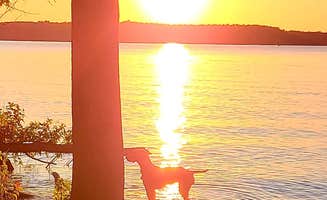Equestrian camping options near Pittsboro, North Carolina provide dedicated spaces for riders and their horses within the Piedmont region. Located in Chatham County with elevations ranging from 350-500 feet, the area experiences mild winters and warm summers, making spring and fall ideal for trail riding. Local horse camps vary in their amenities and trail access requirements, with most requiring advance planning for overnight stays.
What to do
Trail riding on maintained paths: At Cedarock Park, equestrians can access 6 miles of designated horse trails separate from hiking paths. As reviewer Kelsey L. notes, "The park is also home to 6 miles of hiking trails and 6 miles of equestrian trails," making it suitable for both horseback riding and hiking groups.
Fishing from shorelines: Many camping areas provide lake access where riders can fish after trail rides. At B.W. Wells Campground, campers appreciate the water proximity: "There was a lake nearby with an open sky where you could see hundreds of stars at night," shares reviewer Kristen W., highlighting the dual benefit of fishing access and stargazing opportunities.
Historical farm exploration: Several camping areas feature restored farm buildings and educational displays. Cedarock Park offers "a historical farm restored to the late 1800s time period," according to Kelsey L., providing context about regional agricultural practices that shaped the local landscape and trail systems.
What campers like
Secluded camping spots: Many equestrian campgrounds maintain distance between sites for horse comfort. At Cane Creek Campground, reviewer Mandy L. appreciated that "Our site (17) was on the opposite side of the real lake access and right across from the annual spots," showing how site selection affects camping experience.
Clean facilities despite rustic settings: Campers consistently mention bathroom maintenance as important when traveling with horses. Dimitry A. notes about Cane Creek, "It's got showers with hot water and accessible facilities. Great camping!" which matters after long days on dusty trails.
Spacious sites for trailers: Horse trailers require extra space beyond standard camping equipment. At Crosswinds Campground, Paula U. confirms "The camping sites are spacious and most are level," which helps when setting up temporary containment systems for horses.
What you should know
Water access varies significantly: Many horse camps lack running water for animals. At William B. Umstead State Park, camper Sydney S. explains, "Showers, bathrooms, and running drinking water is nearby," but this refers to human facilities, not horse-specific water sources.
Reservation requirements: Most equestrian sites require advance booking, especially during peak seasons. Reservation policies can differ, with some sites being first-come: "Reservations are required (though they do accept walk-ins at the park office)," notes Kelsey L. about Cedarock Park.
Noise considerations: Some campgrounds experience unexpected noise despite rural settings. Tara T. observed at Cedarock Park, "The only downside is the road noise at night - it was very loud. Next time we will bring something to help quiet the noise," which can affect both horses and riders trying to rest.
Tips for camping with families
Choose sites with playgrounds: Families appreciate designated play areas after trail rides. At Falls Lake, Shannon S. reports, "The lake is great, roped off area for swimming with a great little sandy beach area next to a playground and toilets," offering alternatives for children when not riding.
Look for multi-use trails: Family-friendly horse camps often feature beginner-friendly paths. Reviewer Sarah M. experienced this at B.W. Wells: "Our campground lined the lake so just through the trees, we were able to go for a quick dip or sit and watch the water," showing how water access supplements trail riding.
Pack for weather variables: The Piedmont region experiences sudden weather changes that affect trail conditions. At North Carolina State Fairgrounds, Joy B. notes practical site features: "Gravel roadways and grass/gravel sites. Most sites appear to be fairly level," which helps manage camping during unexpected rain.
Tips from RVers
RV length restrictions: Horse trailers with living quarters face different limitations than standard RVs. Paul H. from Crosswinds Campground shares, "We loved being in the park and it easily accommodated our 39ft. Class A. Back-in site but with plenty of room to do so," indicating sufficient space for larger rigs.
Electrical requirements: Horse trailers often need reliable power for living quarters. LaKevius M. confirms at State Fairgrounds, "Good WiFi, great cellular... Water, electric, sewer, and WiFi provided," which matters for extended stays with horses.
Parking surface conditions: Ground stability affects both RVs and horse trailers. Joy B. observes about State Fairgrounds, "Sites are spacious and full hook ups. Gravel roadways and grass/gravel sites," noting the mixed surfaces that affect trailer stability during loading and unloading.


